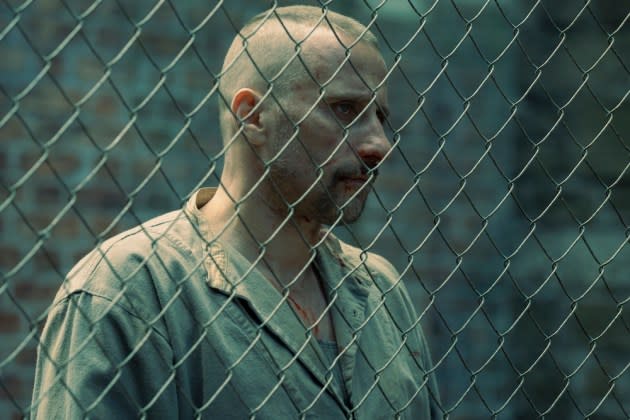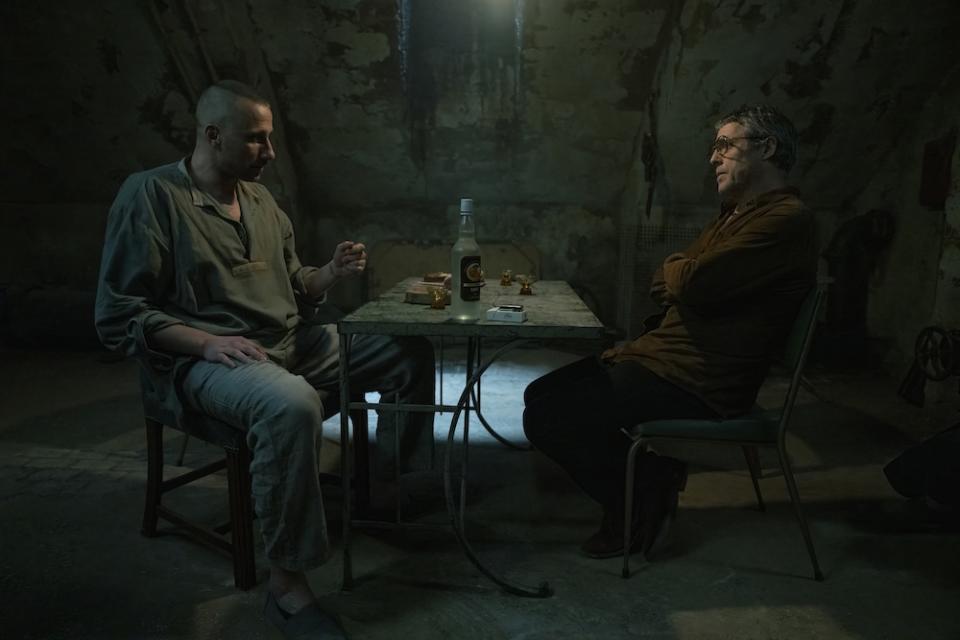‘The Regime’ Star Matthias Schoenaerts on Working With Hugh Grant, and That Crazy Sex Scene With Elena: ‘He Gives Her What She Wants’

SPOILER ALERT: This post contains spoilers from “Midnight Feast,” the fourth episode of HBO’s “The Regime,” now streaming on Max.
For Herbert Zubak, it only took public humiliation, imprisonment, murder and a mental breakdown to bring him some clarity.
More from Variety
At the start of Episode 4 of HBO’s “The Regime,” the tortured soldier (played by Matthias Schoenaerts) is sleep-deprived and barely holding on in prison. Every day, Zubak is forced to listen to a daily address by Chancellor Elena (Kate Winslet), who turned on her loyal right-hand man in last week’s episode by making him the ridicule of the country during the lavish Hero’s Banquet, calling him a “butcher” and cruelly teasing him sexually until he lost his cool and nearly killed her.
Now a prisoner, Zubak is refusing to sleep so as not to dream of the woman to whom he has devoted his life. But suddenly, he is confronted with the truth when he learns he is sharing this prison with the disgraced former chancellor Edward Keplinger (guest star Hugh Grant), whom Elena defeated in an election seven years prior and then jailed — despite telling the country he is off living an extravagant life on the taxpayers’ dime. Over a few meals of contraband food and alcohol, Keplinger begins to shatter the facade of Elena’s world for Zubak, telling him of the lengths to which she goes to hold onto power, including dragging him to a mountain house to “film a little fiction” of his so-called glamorous life that she can dispense to the masses and keep public sentiment in her favor.

Initially resistant to these revelations, Zubak begins to question his allegiance to Elena, if only until Keplinger tries to recruit Zubak to join his planned coup of her government. In a final confrontation, Keplinger feels Zubak slipping back under Elena’s influence, and degrades him to the point that Zubak kills him.
“To feel, again, that he was going to suffer some type of emotional and intellectual abuse by someone else is just too much in that moment,” Schoenaerts tells Variety. “He just lets his emotions get the best of him, and he finishes the job.”
After learning that Zubak has killed the charismatic former occupant of her throne, Elena summons him back to the palace where they consummate their attraction — and power dynamic — right in front of the staff, as well as her horrified husband, Nicky (Guillaume Gallienne).
With only two episodes left for “The Regime,” Schoenaerts talked to Variety about the death and rebirth of Zubak in prison, whether Keplinger’s ever had a chance at swaying him — and whether the volatile Elena can be trusted. Schoenaerts’ answer to that last one is simple: “Hell no!”
Elena tore Zubak down in every way last week. She calls him “Butcher,” and allows him to be humiliated at the Hero’s Banquet. Why does she put him in his place at that point in their relationship?
I can’t speak for her motives, but I think it comes with her natural desire for power, and building someone up just to destroy them is kind of the ultimate thing to do as a power-hungry individual. And it absolutely destroys him, because when he ends up in prison, he’s in the darkest place he has ever been. It’s rock bottom.
But what’s beautiful in this episode is that we see Keplinger try to get under his skin and disrupt his loyalty to her, but it doesn’t happen. I find that an extremely beautiful characteristic of Zubak’s, to stay loyal to a love, even though that love is what drags you down to the lowest place of your life. It is profound.
What was this episode’s change of scenery like for you? Because this cramped, dungeon-like prison is far from the pleasures and sunlight of Elena’s palace.
It is literally the darkest place for him, but also a place where he can actually be reborn somehow. It is kind of the death of Zubak, and this rebirth. I really interpreted it as such. It was nice to have a change of scenery for sure, but I am someone who likes fresh air and big spaces. To be locked up, so to speak, it gave me some anxiety. But then you let yourself be fueled by that, and use it for the character. I truly love Episode 4 and shooting it. Really all of the episodes have their own DNA, narratively, and a face of their own.
Zubak gets a different sparring partner during his prison sentence, in Elena’s former opponent Keplinger. What was it like working with Hugh Grant?
I loved it. I was excited to work with Hugh. He came in like week nine or 10 of shooting, and I can imagine it’s not easy to jump into a team that has already developed its own language and rhythm, because you have to find that right pitch for yourself. But right from the first rehearsal, he was locked in with us. We just had a blast together. I really enjoyed it, and he’s really funny in an odd way. And he is a really generous scene partner. It was a lot of fun.
Do you think that Keplinger’s attempt to turn Zubak against Elena ever works, even for a moment?
Yeah, I think the hurt and the confusion he is suffering, it makes him very vulnerable. It allows your psyche to rewrite and recode someone’s mind. But luckily, Zubak reconnects and stays on track with his true conviction for Elena. He doesn’t lose that battle.
But he does show Keplinger some compassion after Elena has him beaten up. Zubak relinquishes some of that aggression toward him, even though he eventually turns on him.
It is because he realizes the intention is not sincere. We could argue that Zubak’s emotional intelligence is actually strongly developed and, together with Agnes [Andrea Riseborough], they are the most normal people in the show.
Imagine these two being the most normal people in the show? What kind of show is that!
When Zubak kills Keplinger at the end, do you think he did that for himself, or did he do it for Elena?
To some extent, there might be an altruistic component to it. But I think it was the amount of hurt he has already suffered from Elena, and then here he is experiencing the same all over again from someone he doesn’t care as strongly about. That’s what sends him over the edge. As Zubak said, “I would love you, but I don’t.” To feel, again, that he was going to suffer some type of emotional and intellectual abuse by someone else is just too much in that moment. He just lets his emotions get the best of him, and he finishes the job.
The final scene of the episode finds Zubak being brought to Elena and, without saying a word, they start to rip each other’s clothes off in this almost animalistic display of passion in front of everyone.
Which is almost like a meta scene. Is this really happening, or is it in Zubak’s head after he finally got some sleep?
It is a very surreal moment, and one that is a direct response to the end of last week’s episode where she taunts him by saying, “You dream of having sex with me.” It has echoed in his head this entire episode and now it is happening.
And I love that dynamic because we tend to always sexualize women, and here we have a reversal. She really tries to trigger that animalism in him, which makes sense because he loves her and he probably does want to have sex with her. But that is definitely not his main drive at all. I like the fact that we have this woman who is constantly trying to push that button, and eventually he surrenders to it. But not because he truly wants that. He suspects her to really want that. It is reverse psychology, in a way. He gives her what she wants.
The dynamic between Zubak and Elena is going to change after consummating their relationship. What does that mean for the rest of the season?
It opens up a can of worms, for sure. But it also opens up a different interaction between them, and a different energy. All of a sudden, that animalism has been incarnated. That opens the possibility for characters to reveal their true nature. The intimacy and sexuality just activates a different part of the psyche, and it propels them into another set of mad events.
Can Zubak ever really trust Elena? She has proven she has the capacity to deeply wound him for her own gain.
That’s a big part of the tragedy within him. He definitely wants to trust her, and he does trust her. But deep down, there is that little red buzzer that messes with him, and conflicts him and hurts him. Can he really trust her? Hell no! But he does love her, and what he does for that love in these next episodes, that’s what made me love him. To me, it is what makes him the emotional compass of the series.
This interview has been edited and condensed.
Best of Variety
Sign up for Variety’s Newsletter. For the latest news, follow us on Facebook, Twitter, and Instagram.


